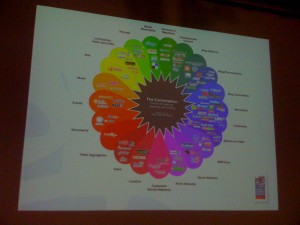When I say Pelican I’m actually not talking about a bird but #pelc10 which is actually the Plymouth E-Learning Conference an annual event in April. It is where hundreds of educators from around the globe discuss the latest issues in Educational Technology. It is always held at the University of Plymouth which is a fantastic venue in the state of the art Roland Lewinsky building, but is obviously also brilliant due to its close proximity to bus and train stations and to the many hotels that the attendees stay in.
The conference is held over two days and is completely jam packed full of really diverse and interesting seminars, workshops and panel sessions. There was even a 3D theatre experience in the University’s new cinema which was a particular highlight for me although I felt a little sick afterwards.
I urge you before you do anything else to have a look at the link below and quickly read through the schedule; I have never been to a conference that I found it so difficult to choose what sessions to attend due to the concern of missing something else.
http://www2.plymouth.ac.uk/e-learning/
The conference was opened and welcomed by Steve Wheeler AKA @timbuckteeth who is the lead organiser, conference chair and guru for PELC this was then followed by a welcome address from Professor Brian Chalkey who is Director for learning and teaching at the University of Plymouth (Who I know as a governor at our school) He spoke about the extreme importance of the role of technology within education. Up next was one of the best keynotes I have ever been in from Josie Fraser @josiefraser who did a fantastic job at opening the conference and really making you reflect on some important questions.
Josie started by talking about the ungooglable man – ‘even the most powerful search engines cannot detect him’ asking the audience why does the ‘ungooglable’ man not need to be online? Several people mentioned things like privacy, just leave him alone, it could be down to vulnerability etc. It was a really interesting starting point and made me think. You can see more on the post here:
The Ungoogleable Man http://majzel.blogspot.com/2010/03/ungoogleable-man.html
Josie then tackled the question of why is digital participation important?
She discussed that functions and processes are increasingly being organised around networks rather than physical spaces for example Facebook happened! In 2009 facebook passed 3500,000,000 I think got the 0’s right! At this moment in time something like Farmville now has 69 million users wow! Times are changing she gave an example of how we communicate via wireless chatting to your neighbours through your wireless signal which I loved e.g Your dog barks all the time – may try this myself.
Josie then spoke about the importance of Digital Literacy – what is it? Josie referred to the Becta definition of things like digital tool knowledge, critical thinking, collaborative skills and social awareness.
A really important part of Josie’s keynote was when she talked about anonymity and identity online. Some people argue there shouldn’t be anonymity online, she asked whether people have a right to this? Online identity is persistent, replicable, searchable, scalable, (de)locatable – we should all be at least aware of the potential of our Digital footprint, how permanent is it? When we say forever in online terms this may only be 5 years or so. Do we have a right to control our digital identity? Josie says don’t think we will see separate identities happening from people like google etc However another issue is around employment – is it right for an employer to check your online identity? Should you not be able to have a public visible social life? I suppose common sense should be a social courtesy from people not to publish embarrassing photos or to identity others!
Josie then finished by talking about communities – ‘The C word’ Community is this the best word to use? Is it a good definition? It is better more human than node etc Talks about Scott Wilsons 2006 definitions of communities – communities of interests – is that social networking? She then mentioned Wenger 2007 – communities of practice – learning is a central part of communities, the practice of creating identities in relation to communities. The importance of considering things like sustainability – Rethink it! How do we archive the content of our communities? How is it sustainable? How can it be preserved? What about amplification – the networks that you create and are part of will benefit from interaction with the outside world! E.g. live feeds
Thank you to Josie who made a brilliant start to a brilliant conference, it really set the tone of what great work was to follow. What do you think about what Josie said? What are your thoughts and views on digital identity and communities?

